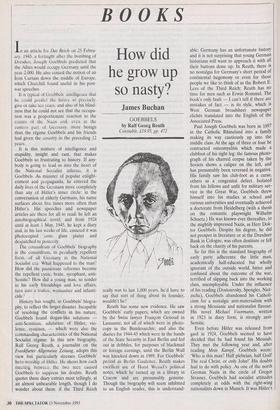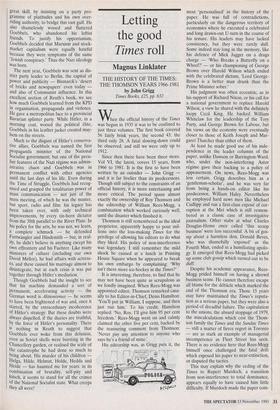BOOKS
How did he grow up so nasty?
James Buchan
GOEBBELS by Ralf Georg Reuth Constable, £19.95, pp. 472 In an article for Das Reich on 25 Febru- ary. 1945. a fortnight after the bombing of Dresden. Joseph Goebbels predicted that the Allies would occupy Germany until the year 2.000. He also coined the notion of an Iron Curtain down the middle of Europe. which Churchill found useful in his post- war speeches.
It is typical of Goebbels intelligence that he could predict the future so precisely. give or take ten years; and also of his blind- ness that he could not see that the occupa- tion was a proportionate reaction to the crimes of the Nazis and. even in the eastern part of Germany. more benign than the regime Goebbels and his friends had given the country in the preceding 12 years.
It is this mixture of intelligence and stupidity, insight and rant, that makes Goebbels so frustrating to history. If any- body is going to lead us into the heart of the National Socialist inferno, it is Goebbels. As minister of popular enlight- enment and piopaganda, he entered the daily lives of the Germans more completely than any of Hitler's inner circle: in the conversation of elderly Germans, his name surfaces about five times more often than Hitler's. His speeches and newspaper articles are there for all to read; he left an autobiographical novel; and from 1924 until at least 1 May, 1945, he kept a diary and, in his last weeks of life, ensured it was photocopied onto glass plates and despatched to posterity.
The conundrum of Goebbels' biography is the conundrum, in peculiarly repellent form, of all Gem many in the National socialist era. What happened to the man? How did the passionate reformer become the repellent cynic, brute, sycophant, anti- Semite? How did a young man, so tender in his early friendships and love affairs, turn into a trailui, womaniser and infanti- cide?
History has sought, in Goebbels' biogra- phy, to reflect the larger disaster. Incapable of resolving the conflicts in his nature, Goebbels found slogan-like solutions — anti-Semitism, adulation of Hitler, vio- lence, cynicism, — which were also the commanding characteristics of the National Socialist regime. In this new biography, Ralf Georg Reuth, a journalist on the Frankfurter Allgemeine Zeitung, adopts this view but particularly stresses Goebbels' hero-worship of Hitler. He shows how each meeting between the two men caused Goebbels to suppress his doubts. Reuth quotes these diary 'entries most tellingly, at an almost unbearable length, though I do wonder about them: if the Third Reich
really was to last 1,000 years, he'd have to say that sort of thing about its founder, wouldn't he?
Reuth has some new evidence. He saw Goebbels' early papers, which are owned by the Swiss lawyer Francois Genoud in Lausanne, not all of which were in photo- copy in the Bundesarchiv; and also the diaries for 1944-45 which were in the hands of the State Security in East Berlin and fed out in dribbles, for purposes of blackmail or foreign earnings, until the Berlin Wall was knocked down in 1989. For Goebbels' period as Berlin Gauleiter, Reuth makes excellent use of Hurst Wessel's political notes, which he turned up in a library in Cracow and are presumably genuine. Though the biography will seem inhibited to an English reader, this is understand-
able: Germany has an unfortunate history and it is not surprising that young German historians will want to approach it with all their buttons done up. In Reuth, there is no nostalgia for Germany's short period of continental hegemony or even for those people we like to think of as the Robert E. Lees of the Third Reich: Reuth has no time for men such as Erwin Rommel. The book's only fault — I can't tell if there are mistakes of fact — is its style, which is West German broadsheet newspaper clichés translated into the English of the Associated Press.
Paul Joseph Goebbels. was born in 1897 in the Catholic Rhineland into a family making its way cautiously up into the middle class. At the age of three or four he contracted osteomyelitis which made a clubfoot of his right leg: the famous photo- graph of his charred corpse taken by the Soviets shows a caliper on the left, and has presumably been reversed in negative. His family saw his club-foot as a curse, others as a congenital defect. Isolated from his fellows and unfit for military ser- vice in the Great War, Goebbels threw himself into his studies at school and various universities and eventually achieved a doctorate from Heidelberg (with a thesis on the romantic playwright Wilhelm Schuetz.) He was known ever thereafter, to the mightily impressed Nazis, as Herr Dok- tor Goebbels. Despite his degree, he did not prosper in literature or at the Dresdner Bank in Cologne, was often destitute or fell back on the charity of his parents.
So far this is the standard biography of early party adherents: the little man, academically half-educated but wholly ignorant of the outside world, bitter and confused about the outcome of the war, terrified of slipping back into the working class, unemployable. Under the influence of his reading (Dostoievslcy, Spengler, Niet- zsche), Goebbels abandoned his Catholi- cism for a nostalgic anti-materialism with a strong Messianic and nationalist flavour. His novel Michael Voonnann, written in 1923 in diary form, is strongly anti- Semitic.
Even before Hitler was released from gaol in 1924, Goebbels seemed to have decided that he had found his Messiah. They met the following year and, after reading Mein Kampf, Goebbels wrote: 'Who is this man? Half plebeian, half God! The real Christ, or only John!' His doubts had to do with policy. As one of the north German Nazis in the circle of Gregor Strasser, Goebbels had socialist attitudes completely at odds with the right-wing nationalists down in Munich. It was Hitler's
great skill, by insisting on a party pro- gramme of platitudes and his own over- riding authority, to bridge this vast gulf. He also shamelessly wooed and flattered Goebbels, who abandoned his leftist friends. To justify his opportunism, Goebbels decided that Marxism and stock- market capitalism were equally hateful because they were symptoms of the same 'Jewish conspiracy.' Thus the Nazi ideology was born.
The next year, Goebbels was sent as dis- trict party leader to Berlin, the capital of Power and publicity — Bismarck's 'desert of bricks and newspapers' even today — and also of Communist influence. In this excellent section of Reuth's book, we see how much Goebbels learned from the ICPD in organisation, propaganda and violence. He gave a metropolitan face to a provincial Bavarian splinter party. While Hitler, in a morning coat, wooed the political elite, Goebbels in his leather jacket created may- hem on the streets.
Much to the disgust of Hitler's conserva- tive allies, Goebbels was named the first Propaganda minister of the National Socialist government; but one of the pecu- liar features of the Nazi regime was admin- istrative chaos and Goebbels was in permanent conflict with other agencies until the last days of his life. Even during the Time of Struggle, Goebbels had recog- nised and grasped the totalitarian power of mass communication — not just of the mass meeting, of which he was the master, but sport, radio and film: his legacy has been taken over, with only technical improvements, by every tin-horn dictator from the 38th parallel to the River Plate. In his policy for the arts, he was not, we learn, a complete schmuck — he defended Furtwangler and Hindemith — but, in real- ity, he didn't believe in anything except his own effrontery and his Fuehrer. Like many ministers of culture (including our own David Mellor), he had affairs with actress- es, and these caused his marriage almost to disintegrate, but at each crisis it was put together through Hitler's mediation.
Though Goebbels had the insight to see that his machine demanded a sort of Permanent, accelerating activity — the German word is Aktionismus — he seems to have been frightened of war and, once it started, by the extraordinary incoherence of Hitler's strategy. But these doubts were always dispelled, if the diaries are truthful, by the force of Hitler's personality. There is nothing in Reuth to suggest that Goebbels ever woke from this delusion, even as Soviet shells were bursting in the Chancellery garden, or realised the scale of the catastrophe he had done so much to bring about. His murder of his children Helga, HiIde, Helmut, HoIde, Hedda and Heide — has haunted me for years: in its Combination of brutality, self-pity and kitsch, it seems to stand for all the crimes of the National Socialist state. What creeps they all were!



























































 Previous page
Previous page